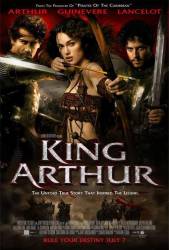Factual error: In the beginning, which is around 400 A.D., it shows that the saddles have stirrups on them. Stirrups were not introduced in Europe until centuries after the fall of the Western Roman Empire.

King Arthur (2004)
Plot summary
Directed by: Antoine Fuqua
Starring: Keira Knightley, Joel Edgerton, Ray Winstone, Ioan Gruffudd, Stellan Skarsgard, Clive Owen, Stephen Dillane
A young Arthur is living with his family in Sarmatia, a land conquered by the Romans. When the Saxons attack, Arthur's father is slain, and the young boy is saved by Sir Hector, who takes him to be raised in England as a Roman soldier.
Years later, Arthur (now portrayed by Clive Owen) has become the respected leader of a small band of knights known as the Sarmatian Knights. They are about to complete fifteen years of service to the Roman Empire and have been promised freedom. However, before they can be released, they are given one final mission by Bishop Germanius: rescue the son of a Roman nobleman trapped behind enemy lines in the north of Britain.
Arthur and his knights, including Lancelot (played by Ioan Gruffudd), Gawain (portrayed by Joel Edgerton), Tristan (played by Mads Mikkelsen), Galahad (portrayed by Hugh Dancy), and Bors (portrayed by Ray Winstone), embark on their quest. As they travel, they rescue Guinevere (portrayed by Keira Knightley), a Woad warrior who was being held captive by the Romans.
The group discovers that the Saxons, led by Cerdic (portrayed by Stellan Skarsgård), are planning a massive invasion of Britain, using the Roman withdrawal as an opportunity. Arthur decides to return to the Roman villa where he grew up, now abandoned, and use it as a base to defeat the Saxons. They arrive at the villa and prepare for battle.
The Saxons attack, and a fierce battle ensues. However, Arthur realises that many of the Sarmatian Knights, including Lancelot, Gawain, and Galahad, are fighting for a cause they no longer believe in. This causes Arthur to question his own loyalty to Rome. The battle ends in victory for the knights, but Lancelot is captured by the Saxons.
Arthur decides to negotiate with Cerdic for Lancelot's release. He offers himself in exchange but secretly plans an ambush. The ambush is successful, and Arthur stabs Cerdic, killing him. However, during the skirmish, both Tristan and Gawain are mortally wounded.
Returning to the Roman villa, Arthur and his remaining knights celebrate their victory. However, the victory is short-lived, as they receive news that the Saxons have regrouped and are planning another invasion on the night of the Battle of Badon Hill. Arthur and his knights prepare for the decisive battle.
On the night of the battle, the knights engage in fierce combat and manage to win the battle with the help of the Woads, a native warrior tribe led by Guinevere. In the process, Arthur is mortally wounded, but with his last breath, he proclaims that his Knights should be freed and given land in Britain.
The movie ends with Arthur being sent off on a river burial, and the remaining Sarmatian Knights and Guinevere leading the surviving Britons into a new era, establishing the foundation for the Knights of the Round Table and King Arthur's legacy.
Cerdic: You come to beg a truce, you should be on your knees.
Arthur: I came to see your face so that I alone may find you on the battlefield. And it will be good of you to mark my face, Saxon, for the next time you see it, it will be the last thing you see on this earth.
Cerdic: Ahhh. Finally, a man worth killing.
Trivia: Twenty years ago, there was a series on British TV called Robin of Sherwood. Will Scarlet was played by Ray Winstone. One of the other Merry Men (Nasir) was played by Mark Ryan, who was the sword master on King Arthur. The horse master was Steve Dent who is (you guessed it) horse-master on this movie as well.
Question: What does the Saxon who rallies the troops actually yell? He yells it twice: once, after Cerdic meets with Arthur in front of the wall and gives the order to "prepare the men for battle", and then a second time when Cerdic gives the signal after the only survivor of the first "wave" comes back through the wall. (And I don't mean his cry of "battle formation.").
Answer: He yells 'Schlachtet den feind!' (In very, very bad "German") - 'slaughter the enemy!'. And his army seems to yell: "Schlachtung! Schlachtung! Schlachtung..." - "Slaughter! Slaughter! Slaughter..."
Join the mailing list
Separate from membership, this is to get updates about mistakes in recent releases. Addresses are not passed on to any third party, and are used solely for direct communication from this site. You can unsubscribe at any time.
Check out the mistake & trivia books, on Kindle and in paperback.




Answer: I don't think it's supposed to be German. Probably Old Saxon. Could be something like "slahten fiand" - slaughter enemy.